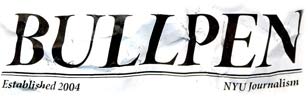Backgrounder: Benedict Carey
RELATED:
Benedict Carey is proof that the world of numbers can spawn a man of letters.
Carey, 45, graduated from the University of Colorado with a degree in mathematics in 1983. But he eventually decided that neither math nor physics, which he had also studied, were his métier. “I wasn’t enjoying either,” he said in a February 2006 interview with this reporter. “The problems were getting harder, my brain was hurting.”
After ruling out a career in academia, Carey contemplated other ways of applying the knowledge he’d gained through his studies. He began reading Science 80, a “great science magazine,” now defunct. Seeing science translated into journalism was an epiphany for Carey, prompting him to enroll in a one-year journalism program at Northwestern in 1985.
In 1987, Carey joined Hippocrates, a San Francisco-based mainstream medical science magazine. As a staff writer, he covered myriad subjects, ranging from drugs and genetics to psychology and fertility.
Carey migrated to Los Angeles in 1997, where he freelanced before landing a position as a health and fitness reporter at The Los Angeles Times. Carey’s article “Hard to Swallow,” debunking the purported health benefits of drinking eight glasses of water a day, garnered a University of Missouri Lifestyle Award in 2002.
In 2004, The New York Times hired Carey to cover human behavior and psychology for the Science section. In this role, he covers everything from the chemistry of complex emotions to the genetics of partisan thought. In the May 2005 article “Watching New Love as it Sears the Brain,” Carey explored the mysterious realm of love, describing how brain scans reveal that “new love can look for all the world like a mental illness.” And, in “Some Politics May be Etched in the Genes,” (June 2005) Carey discussed how “a child raised on peace protests and Bush-loathing” might actually be genetically predisposed towards liberalism.
According to Carey, his role as a journalist is “to represent readers as best [he] can, by finding interesting stuff to cover, deciphering jargon, and exposing BS”—a winning formula for the mathematician-turned-writer.
SOURCES
- Carey, Benedict. E-mail Interview. 17 Feb 2006.
- —-, E-mail Interview. 19 Feb 2006.
- —-, “Watching New Love as it Sears the Brain.” The New York Times. Jan. 24, 2006.
- —-, “Some Politics May Be Etched In the Genes.” The New York Times. June 21, 2005.

